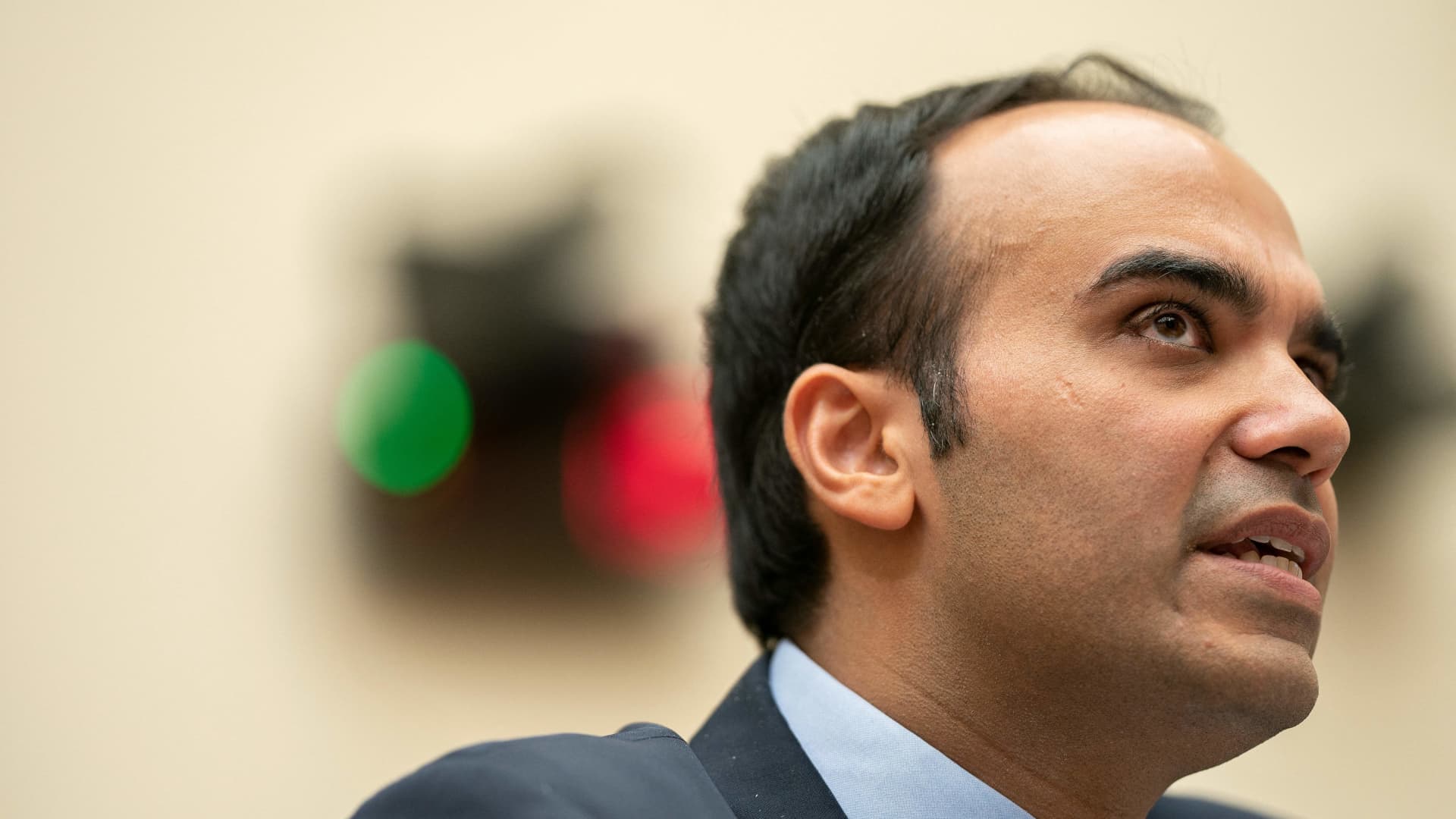Rohit Chopra, director of the Consumer Financial Protection Bureau, testified during a Senate Banking, Housing and Urban Affairs Committee hearing on April 26, 2022.
Tom Williams | Cq-roll Call, Inc. | Getty Images
Rohit Chopra, the director of the Consumer Financial Protection Bureau (CFPB), has outlined ambitious plans to address a range of issues, including artificial intelligence threats, medical-debt reporting, exorbitant credit card fees, and other junk surcharges. Unfortunately, these plans are at risk due to a legal challenge to the CFPB’s funding structure, which a federal appeals court deemed unconstitutional. The court ruled that the CFPB’s funding mechanism, which involves transfers from the Federal Reserve Board of Governors rather than appropriations from Congress, violates the Constitution.
For years, Republican lawmakers have criticized the agency, with Rep. Andy Barr, R-Ky., going so far as to call the CFPB “the most unchecked, unaccountable agency in the whole federal government.” He accuses Chopra of acting unilaterally and arbitrarily without proper oversight. The Supreme Court is set to hear the appeal to the lower court ruling in October, and this uncertainty is a major concern for Chopra.
In an interview with CNBC, Chopra acknowledged that the CFPB has faced attacks before but assured that it will continue its important work for the public. Despite these challenges, Chopra outlined the CFPB’s key policy objectives in the coming months.
Consumer Debt
Chopra predicts that consumer debt will reach or exceed the trillion-dollar mark this year, with credit card debt and auto loans comprising the majority of that amount. He highlights the surge in car prices during the pandemic, which led many people to take on large auto loans. The agency plans to target unnecessary repossessions in the auto loan market. Additionally, the restart of student loan payments in October is expected to impact consumer credit markets. The CFPB, in collaboration with the Education Department, will focus on student loan servicers to promote alternative repayment plans and prevent delinquency. Chopra emphasizes the importance of holding these companies accountable and working with state attorneys general and regulators to ensure compliance.
Medical Debt
Chopra highlights the significant burden of medical debt on tens of millions of Americans. According to CFPB reporting, one in five individuals is affected by a total of $88 billion in unpaid medical bills currently in collection. Total medical debt in the United States exceeded $195 billion in 2019, with millions of adults owing various amounts. Chopra acknowledges the red tape that individuals often encounter between insurance companies and hospitals. Furthermore, he questions the appropriateness of including medical debt on credit reports and has ordered debt collectors and credit-reporting agencies to cease collecting, furnishing, or reporting on invalid medical debt. These policy changes have been implemented by Equifax, TransUnion, and Experian.
Junk Fees
The CFPB recently imposed a fine of approximately $150 million on Bank of America for unlawfully double-charging some of its customers for insufficient account balances. The agency’s crackdown on junk fees aligns with the Biden administration’s efforts to reduce extraneous surcharges. Chopra aims to eradicate these illegal practices from the market, emphasizing that junk fees provide no service, are unwanted, and lack fair competition. Some big banks have already made policy changes in response to the CFPB’s actions, resulting in billions of dollars in fewer fees annually. However, GOP members of the House, such as Rep. Blaine Luetkemeyer, R-Mo., question the CFPB’s authority in regulating credit card fees.
Artificial Intelligence
Chopra expresses concerns regarding the potential negative impact of artificial intelligence on banking consumers. If AI systems fail to provide a clear explanation for loan denials, they may violate compliance requirements. Chopra emphasizes the need for lenders to understand and adhere to existing protections under the law. He also highlights the risks associated with the transition from call centers to automated customer-support models, particularly regarding the handling of sensitive personal data by chatbots. The CFPB is actively examining the training methods for chatbots to ensure compliance with federal protections. Chopra emphasizes the importance of shaping technology within legal boundaries to ensure its evolution aligns with consumer rights.
Denial of responsibility! VigourTimes is an automatic aggregator of Global media. In each content, the hyperlink to the primary source is specified. All trademarks belong to their rightful owners, and all materials to their authors. For any complaint, please reach us at – [email protected]. We will take necessary action within 24 hours.


